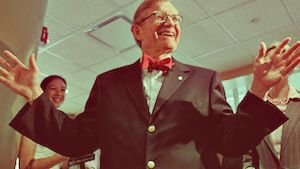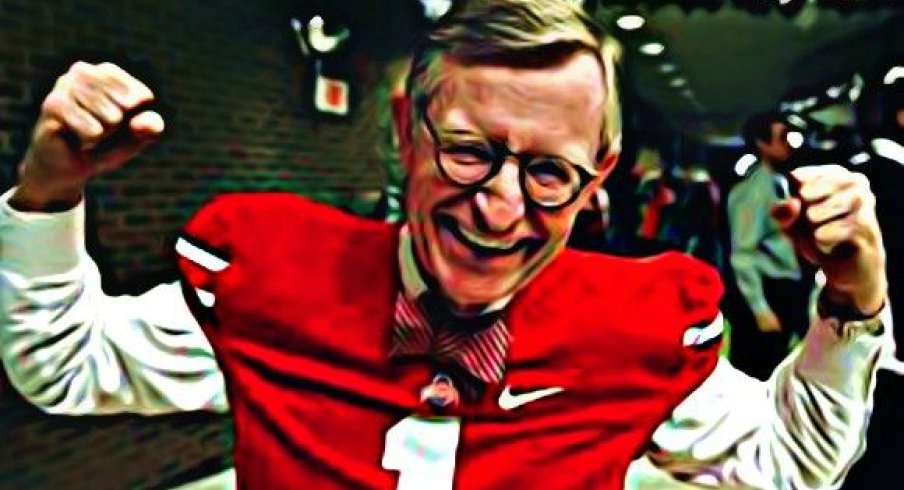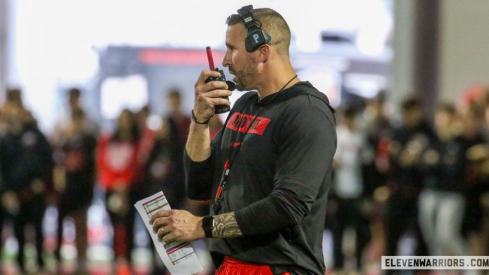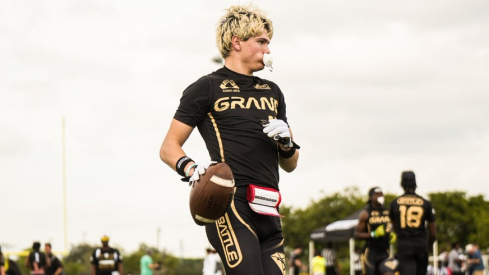Elizabeth Gee was just 46 when breast cancer killed her. She left behind an adopted teenage daughter as well as a grieving husband, who had barely been Ohio State's president for a year when she passed 22 years ago this December.
Elwood Gordon Gee and Elizabeth had been married 22 years earlier in Utah. They've now been apart as long as they were together.
The Gees had each other through college, law school and his rapid ascent into academia that saw him become West Virginia University's president at the age of 37, Colorado's at 41 and Ohio State's at 46. Suddenly, he was a young widower in Columbus, a town he barely knew.
And the town overwhelmed him with comfort during the most challenging time of his life. It rallied around Gee in 1991 and quickly calibrated his unique character with its idiosyncratic culture through the unwanted vehicle of his own personal tragedy. Elizabeth quickly became everyone's shared loss.
Gee was forever changed by this reception. Not just by losing his wife, but by Ohio State's impact on him during that difficult time. It shaped the way he still carries himself today when attending to the affairs of advancing his beloved institution.
Ohio State's president was born a natural salesman talented enough to just show up and win most deals. That's how one becomes the president of a major university before turning 40.
At 69, Gee is quite aware of and extremely comfortable with the skills he has, so you'll have to forgive him for speaking unguardedly as he did last December when he dropped a series of truth bombs during an OSU athletic council meeting. His rapid career ascent didn't transpire because he was cautious.
The president of a top 20 public university made a cheeky literacy joke at the expense of an athletic conference comprised largely of historically mediocre schools. He also made disparaging but accurate comments about ham-scented serial blowhard Bret Bielema.
But perhaps above all else, a Mormon made a Catholic joke. This all took place on the same tape acquired by the AP through a routine public records request. A predictable inflated outrage spasm from all of the usual, lightly-informed suspects ensued.
 E. Gordon "Brutus" Gee, unveiled on campus in 2007.
E. Gordon "Brutus" Gee, unveiled on campus in 2007.
Some thought Gee should be fired for his comments, which was the laziest conclusion to be drawn. His well-documented fundraising prowess has been invoked as the reason for his job security, but as important as his value is to Ohio State is understanding why Gee will never stop being Gee. It began when Elizabeth was taken from him while many of their possessions were still sitting in unpacked moving boxes from Colorado.
When his grief was consumed alongside him by the university community, it left a lasting impression on him. Ohio State became more than just an employer to Gee. His heart and his head became effectively fused together.
As president he was suddenly now selling something far more personal than just a sterile, behemoth university that played football games in an open-air cathedral. It wasn't that Columbus had more empathy than any of his previous stops, or that it is uniquely suited for accommodating grief (though this all took place during a particularly hideous stretch against Michigan).
Ohio State was where he happened to be when his life was ripped apart. Its measure of respect for a relative newcomer was profound, and he never forgot that.
The direct result of that experience is that you simply will not find a university president who is more comfortable, unguarded and defensive about his institution than Gee is with Ohio State.
He was a prodigy in his business long before he arrived in Columbus. Running a university is the pinnacle of apolitical politics; it's selling a product with so many moving parts it's impossible to sufficiently demonstrate. He is a radical reformer of old guard ivory tower academia.
Put Gee as the head of any university (except for perhaps those of the Ivy League like Brown, who found him a little too eager to tinker its underperforming traditions) and those sales skyrocket. When he was selling Vanderbilt, student applications increased by 50% over six years, academic profiles of incoming freshmen improved and he raised over a billion dollars two years ahead of schedule while Vandy's popularity and performance soared.
But that's not how Gee is remembered. He's just a little too interesting for his own resume, which quietly tells you that no American has held more university presidencies than he has.
Ask a cynical writer to summarize Gee's tenure at Vanderbilt and you'll hear something about the president's mansion being extravagantly upgraded while his second marriage loudly crumbled. Question the same cynic about Ohio State and you'll breathlessly about his verbal gaffes and spending on bow ties.
What you won't hear is that Gee took a significant pay cut to return to Ohio State. Then he trimmed millions of dollars in costs while raising billions in new investment while relentlessly tearing down a stagnant routine approach to academia, which is his mortal enemy.
You will not find a president more comfortable, unguarded and defensive about his institution than Gee is with Ohio State.
Remember when Ohio State switched from quarters to semesters? Gee did that, and it wasn't because he disliked quarters (he really didn't care).
It was because he knew doing so would force professors to redesign their courses. Turning the academic calendar upside down had a greater purpose than conformity. He shook up one of the largest university systems in the world and demanded collaboration and relentless innovation while connecting departments previously operating in silos.
But this is how we've always done it doesn't exist at Ohio State under Gee. It was pervasive and stubborn at Brown, which is precisely why he left.
You won't hear much these days about is Ohio State's dramatic and holistic improvement well beyond donations, solvency, research grants and caliber of incoming students - though Time recently named him the best college president in America. Hurr hopefully Jim Tressel won't fire him is so much easier to categorize him.
His second stint as OSU president would be solidifying his towering legacy in academia were it not for the rich stream of harmless verbal gaffes he continues to provide on the record.
And that is the only truly alarming component of Gee's most recent comments: That they were made at an official university function, categorically made accessible to the public through FOIA.
After sustaining Tatgate - enabled by Tressel's use of university email to create easily-discoverable evidence - Gee should have known his comments would inevitably find their way out of the room.
Virtually every move Ohio State officials make is accessible. Ohio's sunshine laws have not been tweaked specifically to shield state university operations from invasive reporting (why hello, ALABAMA). FOIA requests constantly flood its offices. That's the norm, and Gee - and anyone else conducting official Ohio State business - should always be cognizant of that fact.
 Gee has never stopped chipping away at traditional academia
Gee has never stopped chipping away at traditional academia
Short of knowing the color of his morning constitution, anyone with a knack for paperwork and a little extra time can find out whatever they want to about Gee's daily life. The AP did exactly that and made his meeting in December a story in June.
If it had not been the AP, it would have been Deadspin, the Dispatch, the Toledo Blade or literally anyone else with time and curiosity.
Now he'll have to undergo some training charade not so he can learn sensitivity or better joke-telling, but to appreciate that Ohio State's Board of Trustees has absolutely no appetite for even the perception of a scandal.
The Board is not interested in accepting both harmless gaffes and soaring progress, and that's alarming. Where Tressel could teach doctorate-level courses in how to speak at Castro lengths without actually saying anything, Gee would fail that class harder than Rich Rodriguez at a University of Michigan Culture seminar.
We expect people on television and in positions of power to speak in perfect, edited sound bytes - and then when they do we admonish them for being sterile. Being genuine and cheeky results in forced apologies. Gee not gregariously speaking from his gut just isn't Gee. It isn't anything.
And that's not who Ohio State should want leading its charge anyway. Gee didn't guide the university to where it is now by being conventional or robotic. He did it by turning convention on its ear.
The university rallied around him once before, during a far more trying time. He will never forget that, and neither should Ohio State. It should unapologetically do so once again.


